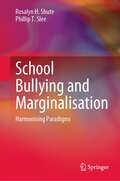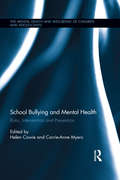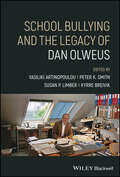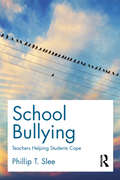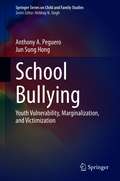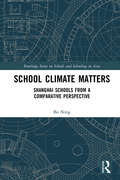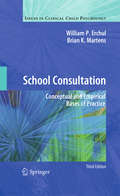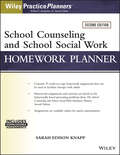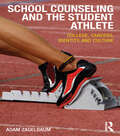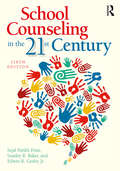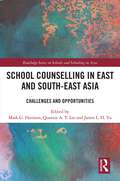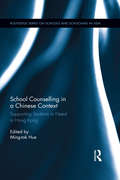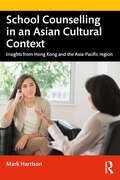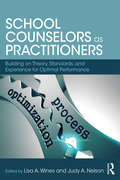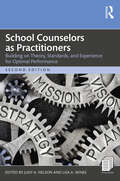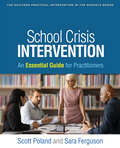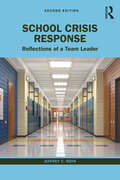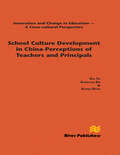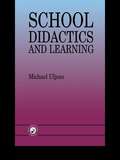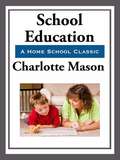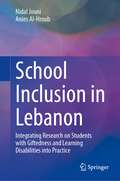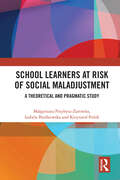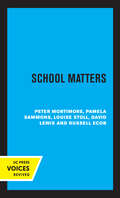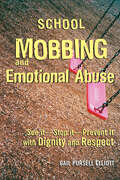- Table View
- List View
School Bullying and Marginalisation: Harmonising Paradigms
by Phillip T. Slee Rosalyn H. ShuteThis book addresses, and seeks to harmonise, different paradigms for understanding school bullying. It sets out to examine two paradigms for conceptualising bullying, and the worldviews that underpin them. It uses a complex systems perspective to bring the two paradigms together in a holistic fashion. By doing so, it creates an integrated framework for conceptualising the many individual, relational and societal factors that are in dynamic interaction and play a part in promoting or reducing school bullying. This book draws upon a number of disciplines by way of background, including evolutionary, child development and social psychological theories of group behaviour and identity. It proposes that the human need for belonging is central to understanding bullying, and situates the topic within an understanding of gender and children’s human rights, bringing philosophical and moral perspectives to bear. It discusses practical ways forward, presents a systemic approach to bullying and application of complex adaptive systems methods to bullying research and evaluation. It serves as an introduction to such methods and suggests further creative ideas for policy, intervention practice, and teacher education about bullying.
School Bullying and Mental Health: Risks, intervention and prevention (The Mental Health and Well-being of Children and Adolescents)
by Helen Cowie Carrie Anne MyersBullying amongst young people is a serious and pervasive problem, and recent rapid advances in electronic communication technologies have provided even more tools for bullies to exploit. School Bullying and Mental Health collates current research evidence and theoretical perspectives about school bullying in one comprehensive volume, identifying the nature and extent of bullying and cyberbullying at school, as well as its impact on children and young people’s emotional health and well-being. There are many negative consequences of bullying, and children and young people who have been victimised often suffer long-term psychological problems, such as increased levels of anxiety, depressive symptoms, social isolation, loneliness and suicidal ideation. Perpetrators of bullying also have a heightened risk of experiencing problems such as anxiety and depression, as well as eating disorders and antisocial behaviour. Founded on rigorous academic research, this important book tackles the negative consequences of bullying, and bullying culture itself, by examining the social and cultural contexts that perpetuate such behaviour from childhood through adolescence and potentially into adulthood. Containing contributions from an international team of authors, this book explores current interventions to prevent and reduce school bullying and to alleviate its negative effects on the mental health of children and young people. In-depth discussion of the profound implications of this research for researchers, practitioners and policymakers makes this book essential reading for those interested in bullying culture and the mental health and well-being of children and adolescents.
School Bullying and The Legacy of Dan Olweus
by Peter K. Smith Susan P. Limber Vasiliki Artinopoulou Kyrre BreivikThe intellectual and personal history of the late Dan Olweus, a pioneer in the field of bullying management and prevention School Bullying and the Legacy of Dan Olweus honours the work and legacy of Dan Olweus, a man generally seen as the “founding father” in the field of bullying management and prevention who initiated a shift in how society, educators, parents and professionals handle and keep track of the hostility that some children display. This book explores how Olweus developed the first widely used questionnaire to survey the issue of bullying and victimisation (the Olweus Bullying Questionnaire, or OBQ), was instrumental in designing the first intervention campaign against school bullying in Norway in the 1980s and developed a multi-layered program of intervention, the Olweus Bullying Prevention Program (OBPP), which is used in many countries around the world. This book also provides constructive criticisms of his work, as well as ways to build on his legacy to reduce the impact of bullying on children and young people. Delivering a summative view of his contribution to this research area, School Bullying and the Legacy of Dan Olweus discusses topics including: Olweus' research and practical achievements over three main stages: first in Sweden, then in Norway and then in later years Uses, strengths and limitations of the OBQ and OBPP, the views of Olweus on cyberbullying and his influence in Japan and China The definition of bullying, bias-based bullying and research challenges around the assessment of interventions The view of the school as a complex adaptive system and the contribution of civil society and of laws and policies against bullying Providing an expansive intellectual and personal history of a leader in the field, School Bullying and the Legacy of Dan Olweus is an essential read for all parents, educators, administrators, researchers and professionals seeking to understand and prevent bullying in schools around the world.
School Bullying: Teachers helping students cope (Positive Education Ser.)
by Phillip SleeTo effectively cope with school bullying it is essential to understand the issues underpinning student peer group dynamics in the school, classroom and community and this view lies at the heart of the text. While the experience of bullying others or being victimized is identified with an individual or group the solution lies with the systems eg community, school, classroom or family of which the individual is part. Particular emphasis is given to the role of prosocial behavior and a strengths based perspective in addressing how students cope with school bullying within a systemic context. The text is strongly informed by the author’s experience in developing and conducting national and international school-based anti-bullying and mental health interventions. The book advocates a systems based approach to addressing school bullying as illustrated with a program developed and evaluated by the author called the ‘P.E.A.C.E. Pack: A program for reducing bullying in schools’. This book translates research into practice with a strong evidence-based application drawing on an extensive data base. Each chapter contains practical information and research on school/classroom/community applications, trends and issues in the field and practical ideas for implementing anti-bullying measures. The first two sections consider ways to promote positive peer relations in schools and the dynamics of peer groups. Consideration is then given to cyber bullying and to theories explaining violence, aggression and bullying. Later sections examine the nature and effects of bullying, from early childhood through to adolescence on vulnerable groups, including students with special educational needs and disabilities and LGBTQ young people. The book details information for schools and teachers on ways to collect data and information to inform the interventions and policies of their school. School and classroom based resources for teachers, counsellors and administrators are identified. With school bullying now a matter of international concern not only to children, young people and their caregivers, but to schools and teachers at the forefront, this book will be important reading for all students in psychology, education, health and social welfare, as well as school administrators, teachers, counsellors and childcare professionals.
School Bullying: Youth Vulnerability, Marginalization, and Victimization (Springer Series on Child and Family Studies)
by Anthony A. Peguero Jun Sung HongThis book examines the associated experiences of school bullying and violence among vulnerable and marginalized youth. It discusses the effects of diversity and disparities in youth’s experiences with bullying. Among these are socioeconomic and social status, family cohesion and interactions, sex, sexual orientation, gender identity and gender expression, race, ethnicity, immigration, religion, and disabilities and special health needs. The book describes the ways in which a social-ecological framework can inform the problem and address school bullying. It addresses not only individual, intrapersonal, and environmental factors of bullying, but also discusses distal level factors and conditions that are specifically relevant to youth (e.g., culture and law). In addition, this volume contextualizes relevant multilevel factors that foster or inhibit bullying victimization among vulnerable and historically marginalized children and adolescents who are faced with cumulative social stratification. Key areas of coverage include: The role of the family (parents and guardians, siblings) – its cohesion and interactions – in school bullying.Race, ethnicity, immigration, and religion and school bullying of marginalized and at-risk youth.Victimization of students with physical, emotional, and learning disorders.Bullying and victimization of vulnerable youth in the court systems. School Bullying is an essential resource for researchers, clinicians and other practitioners, graduate students, and policymakers across such disciplines as child and school psychology, social work and counseling, pediatrics and school nursing, educational policy and politics, and all interrelated disciplines.
School Climate Matters: Shanghai Schools from a Comparative Perspective (Routledge Series on Schools and Schooling in Asia)
by Ning BoThis book describes the effect of school climate on student academic achievement. The unexpected leading position of Shanghai in its first and second appearance of the PISA survey—topping every league table in this assessment by a clear margin—attracted attention from all over the world. This book focuses on the relationship between student academic achievement and the characteristics of students and schools in Shanghai, while showing the effects of these factors within this specific educational ecology. Bo Ning considers the relationship between school climate and student academic achievement using data from PISA 2009 and 2012, with a focus on reading and mathematics. School climate is confined to the quality and characteristics of school life in relationships, and teaching and learning issues from a student perspective. In each chapter, one or several of the following five school climate variables are explored: school appreciation, teacher-student relations, disciplinary climate, reading atmosphere, and supportive climate. In addition to the focus on school climate, three basic concerns run through the whole book: the Shanghai educational context, the comparative approach, and causal inference. This book will be of great interest to academics, researchers, and postgraduate students in the fields of international and comparative education.
School Consultation
by Brian K. Martens William P. ErchulSince its emergence during the 1960s, school consultation has become an important vehicle for delivering psychological and educational services. Cooperative efforts between skilled consultants and teachers, rooted in the principles of problem solving, social influence, and professional development, enhance student learning and adjustment while encouraging consultees to be more effective and proactive in their practice. The Third Edition of School Consultation: Conceptual and Empirical Bases of Practice shows in expert detail how this relationship works by synthesizing mental health and behavioral models of consultation with the most effective evidence-based practices (e.g., implementation support, response to intervention) informing the field today. The authors provide real-world contexts for all participants in the equation--consultants, teachers, students, staff, and the school itself--and thoroughly review consultation processes and outcomes for a contemporary practice-oriented approach suited to the new consultant, trainee, or researcher. Key features of the Third Edition include: An integrated mental health/behavioral model for school consultation.An organizational study of the school as a setting for consultation.Assessment issues and strategies particularly relevant to school consultation.Approaches to providing teachers with implementation support. Conceptual models for selecting academic and behavioral interventions.Administrative perspectives on school consultation.A real, transcribed case study analyzed by the authors.In the tradition of its predecessors, School Consultation, Third Edition, is a confidence-building tool for practitioners in school psychology, clinical child psychology, educational specialties, school counseling, special education, and school social work as well as a trusted reference for researchers in these fields.
School Counseling and Social Work Homework Planner (Practiceplanners Ser.)
by Arthur E. Jongsma Jr. Sarah Edison KnappFeatures assignments and exercises to meet the changing needs of school counselors and school social workers The School Counseling and School Social Work Homework Planner, Second Edition provides you with an array of ready-to-use, between-session assignments designed to fit virtually every therapeutic mode. This easy-to-use sourcebook features: 75 ready-to-copy exercises covering the most common issues encountered in school settings, such as study and organizational skill deficits and academic motivation/underachievement, as well as "outside" issues such as blended families, divorce, substance abuse, teen pregnancy, and parenting skill deficits A quick-reference format—the interactive assignments are grouped by presenting problems including learning difficulties, disruptive classroom behavior, self-esteem building, bullying, and school violence Expert guidance on how and when to make the most efficient use of the exercises Assignments cross-referenced to The School Counseling and School Social Work Treatment Planner, Second Edition—so you can quickly identify the right exercise for a given situation or problem A download code that contains all the exercises in a word-processing format—allowing you to customize them to suit you and your clients’ unique styles and needs Additional resources in the Practice Planners® series: Treatment Planners cover all the necessary elements for developing formal treatment plans, including detailed problem definitions, long-term goals, short-term objectives, therapeutic interventions, and DSM™ diagnoses. Documentation Sourcebooks provide the forms and records that mental health professionals need to efficiently run their practice. For more information on our PracticePlanners® products, including our full line of Treatment Planners, visit us on the web at: www.wiley.com/practiceplanners
School Counseling and the Student Athlete: College, Careers, Identity, and Culture
by Adam ZagelbaumSchool Counseling and the Student Athlete explores empirical, theoretical, and practice-based issues that demand consideration by school-based counseling and educational professionals working at the pre-collegiate level. In its pages clinicians and students will find insights into both why student athletes experience many of the issues they do as well as the steps that counselors can take to help these individuals and their families. Theories of motivation and theoretical approaches to counseling student athletes are covered in order to provide an orientation to working with this group, and the book also includes a thorough discussion of the most important elements of counseling the student athlete: the academic, career, personal, and social issues they face; consultations with coaches, teachers, and parents; commercialism and the student athlete’s identity; and gender, sexual identity, and culture issues. Each chapter ends with discussion questions and available resources for counselors. Grounded in research and pioneering in its analysis of sports psychology for students in grades K-12, School Counseling and the Student Athlete is a must-have for school counselors, clinicians, and other professionals who work with elementary and secondary students.
School Counseling in the 21st Century
by Stanley B. Baker Sejal Parikh Foxx Edwin R. Gerler, Jr.School Counseling in the 21st Century brings the theoretical aspects of school counseling to life. As they move through the book, school counselors in training will begin to identify and develop the significant pieces of a comprehensive school counseling program. They will also experience, through real and relevant case studies, how school counselors are using technology, assessment data, and leadership skills to implement effective programs aimed at serving their students. Each chapter reflects on how the national model for school counseling, standards of practice, multicultural skills, and ethical guidelines are the foundation of building comprehensive programs. School Counseling in the 21st Century comprehensively addresses the 2016 CACREP Standards: the beginning of each chapter outlines which core and school counseling standards are addressed, and chapters support CACREP’s requirement for material on multicultural counseling, ultimately enhancing readers’ knowledge and effectiveness in working with diverse populations.
School Counselling in East and South-East Asia: Challenges and Opportunities (Routledge Series on Schools and Schooling in Asia)
by Mark G. Harrison Lee, Queenie A. Y. Yu, James L. H.This book explores trends in the practice of school counselling in East and Southeast Asia in response to socioeconomic changes, developments in education and schooling, the growth of technology, and the legacy of the recent COVID-19 pandemic.The volume adopts an ecological perspective, taking into account both schools’ institutional contexts and the sociocultural settings in which school counsellors work. Chapters focus on the needs, perspectives, and expectations of different stakeholders and explore the changing roles and identities of school counsellors. Contributions from Mainland China, Hong Kong SAR, Japan, Malaysia, The Philippines, Singapore, and Vietnam provide a wide-ranging account of the development of school counselling in the region and set out key themes and priorities for this fast-developing field.Academics in the field of school counselling, practising school counsellors, academics involved in training programmes for school counsellors and students will find this an invaluable volume. More broadly, this text will be of interest to individuals involved in accrediting bodies for international schools in Asia, and school leaders tasked with overseeing counselling provision and that of well-being.
School Counselling in a Chinese Context: Supporting Students in Need in Hong Kong (Routledge Series on Schools and Schooling in Asia)
by Ming-Tak HueSchool Counselling in a Chinese Context discusses research in school counselling in the Chinese context of Hong Kong schools and various educational settings, and provides a contextualized understanding of counselling issues. This book highlights key contextual conditions for counselling in Hong Kong – a Chinese society. The sub themes addressed in the book include school practices and teacher perspectives on guidance, counselling, behaviour support and school discipline; whole-school guidance program for identity construction; school counselling for ethnic minority students; contextual influence of the use of play therapy; school counselling for students with minority sexual orientation; Chinese cultural influence on counselling, etc. The book also develops new theoretical orientations to understanding various issues of counselling as arisen in the Chinese society of Hong Kong and helps school practitioners to develop culturally responsive approaches to school counselling for personal growth, spiritual and emotional education. The themes addressed in the book include: School practices and teacher perspectives on guidance, counselling, behavior support and school discipline School counselling for ethnic minority students Contextual and cultural influence of the use of play therapy School counselling for students with minority sexual orientation Chinese culture influence on parental participation in counselling School Counselling in a Chinese Context will be of interest to postgraduates and researchers in the field of Counselling, school psychology, child development and Chinese studies.
School Counselling in an Asian Cultural Context: Insights from Hong Kong and The Asia-Pacific region
by Mark HarrisonSchool Counselling in an Asian Cultural Context focuses on the ways in which cultural setting influences the practice of school counseling, its effectiveness, and the experience of young people as they engage in counseling in schools. The mental health of young people is increasingly a cause for concern, particularly in Asia’s high-pressured league-topping education systems, and the wellbeing of students is becoming more a part of the wider remit of schools. Mark Harrison presents a broad overview of the development and current practice of school counseling in Hong Kong in both local and international schools and examines this in relation to school counseling in US and UK settings as well as the wider Asia-Pacific region. The book brings together two foci: the practice of school counseling in the Asian cultural context of Hong Kong, and the effectiveness and experience of school counseling from the perspective of young people and counselors. The diversity of schools in Hong Kong makes it a microcosm of trends and practices in school counseling globally and, as such, offers insights which will be of interest to students in training; school counselors, administrators and policy makers in the Asia-Pacific region and further afield.
School Counselors as Practitioners: Building on Theory, Standards, and Experience for Optimal Performance
by Lisa A. Wines Judy A. NelsonDesigned for school counseling course work and as a reference for school district personnel, this text demystifies the roles and responsibilities of the school counselor and teaches students and practitioners how to perform, conduct, follow through, and carry out various roles and responsibilities required on the job. School Counselors as Practitioners conveys strategic, step-by-step processes and best practice recommendations, with emphasis on ethical and multicultural considerations. The 14 chapters in this textbook maintain, and are consistent with, the basis of school counselors’ work in the school counseling core curriculum, responsive services, individual planning, and system support, and special attention is paid to ASCA and CACREP standards. A companion website provides students with templates and handouts for on-the-job responsibilities, as well as quiz questions for every chapter.
School Counselors as Practitioners: Building on Theory, Standards, and Experience for Optimal Performance
by Lisa A. Wines Judy A. NelsonSchool Counselors as Practitioners, Second Edition, is a hands-on, practice-based, task-oriented guide to being an effective school counselor.Thoroughly revised, this textbook continues to address the foundation of school counseling, the main duties of a school counselor, the skills needed to be successful, and what to expect as a school counseling professional. All these topics have been updated to include the current thinking, research and evidence-based practices, and challenges in school counseling. Additionally, interviews of principals, school counselors, and community leaders are included, which provide readers with the reality of how to navigate the waters of the comprehensive school counseling program. The chapter authors also highlight the necessity of designing, implementing, and evaluating the counseling program for continuous improvement. Online resources provide students with templates and handouts for on-the-job responsibilities, as well as quiz questions for every chapter.This updated edition is essential reading for counselor educators, graduate students enrolled in a school counseling program, supervisors of school counselors, including administrators, and practicing school counselors.
School Crisis Intervention: An Essential Guide for Practitioners (The Guilford Practical Intervention in the Schools Series)
by Sara Ferguson Scott PolandProviding vital tools to enhance preparedness in any school setting (K–12), this book is grounded in state-of-the-art research and real-world experience. Foremost authority Scott Poland and frontline clinician Sara Ferguson address all aspects of team-based crisis intervention and postvention. With a key focus on prevention, the book describes ways to identify risk factors and enhance students' mental health, connectedness, and resilience. Best practices are outlined for responding effectively to specific crises, including unexpected deaths in the school community, youth suicide, school violence, and natural disasters. In a convenient large-size format, the book includes firsthand perspectives from other experts in the field, hands-on strategies to support daily practice, and 23 reproducible forms that can be downloaded and printed. This book is in The Guilford Practical Intervention in the Schools Series, edited by Sandra M. Chafouleas.
School Crisis Prevention and Intervention: The PREPaRE Model
by Stephen E. Brock Shane R. Jimerson Amanda Beth Nickerson Melissa A. Reeves Christina N. Conolly Rosario C. Pesce Brian R. LazzaroUse this book in your school to. Discover critical components of school safety and crisis response planning and training. Follow the latest federal guidance to develop comprehensive school emergency operations plans. Implement drills and exercises to practice on a regular basis. Effectively respond to crises and facilitate recovery and a return to learning through multitiered systems of support. Assess the traumatic potential of crisis events and the impact they have on individuals. Collaborate with community-based emergency response services. Support school staff with care-for-the-caregiver strategies.
School Crisis Response: Reflections of a Team Leader
by Jeffrey C. RothSchool Crisis Response introduces a unique educational approach that provides compelling scenarios for the development of school crisis responders. There are many books describing the how-to of school crisis response, but few describe the thoughts and emotions to help guide the application of skills learned. This book provides narratives about traumatic events to supplement concepts with lessons from actual crises. The author documents the perspective of a team leader, vividly illustrating real events to confront the challenges, decisions, and problem-solving demanded to effectively stabilize emotional reactions, ameliorate trauma, and support resilience and recovery. While encouraging reflection, educating, and strengthening new and experienced responders, this book celebrates the vital work of school psychologists, counselors, administrators, teachers, social workers, and nurses who provide extraordinary service under the most difficult circumstances. It combines an intellectual, evidence-based "in the head" understanding of how to do crisis response with an emotional, empathetic "in the heart" understanding of how it feels to do it.
School Culture Development in China - Perceptions of Teachers and Principals: Perceptions Of Teachers And Principals (River Publishers Series In Innovation And Change In Education Ser.)
by Kai Yu Xiangyun Du Xiaoju DuanSchool culture is playing an increasingly important role in school performance and educational development. Within the national campaign in China for the innovative and sustainable development of education, local governments in Beijing Municipality have encouraged and facilitated educational innovation toward better school culture. In recent years various initiatives have been undertaken by a select group of schools to develop strategies and further action toward innovation and change. This book documents an investigation of how teachers and principals perceive school culture development in China. A survey was conducted among 1,992 informants from 37 schools (located in four different districts) in Beijing Municipality. The results of this study indicated that the respondents had overall positive perceptions of school culture construction and development in the educational change process. In general, they showed a positive attitude toward the school culture improvement initiatives, reported satisfaction about their current school culture and held confidence in the direction their school culture is heading. The study demonstrated that certain factors, such as school geographical location and respondents’ job duty, job title, and gender, make a difference in how participants perceive their school’s culture. Teachers and principals from a less economically developed district had less awareness of, involvement in, and understanding of school culture development in all its aspects. A notable gap between teachers and principals was identified in their perception of the core values and norms of the school and of communication between teachers and principals. This study suggests that for educational development to be further carried forward successfully, there is an urgent need for better distribution of educational resources (both financial and leadership), common understanding, agreed-upon goals, and efficient communication between principals and teachers. KeywordsEducational philosophy, Ethics, Chinese context, Gender, Learning
School Didactics And Learning: A School Didactic Model Framing An Analysis Of Pedagogical Implications Of learning theory
by Michael UljensIn this book a new theory on instruction is presented - a reflective theory of school didactics - uniquely incorporating continental German and Nordic research traditions in the theory of didactics (Didaktik), together with Anglo-American research on teaching (instructional research) and cognitivist theory. School didactics is defined as a field of research within general education. This field is limited to research and theory aiming at understanding the pedagogical practice which takes place in institutionalized educational settings guided by a curriculum collectively agreed upon. As the theory is designed to be valid for institutionalized education framed by a politically accepted curriculum, it is a culturally seen regional theory of education, not a universal one. According to this school theory the fundamental features of an institutionalized pedagogical process consist in the intentional, interactional, teaching-studying-learning process that is culturally and historically developed and situated. However, the present model does not explicitly formulate goals nor the means of educational practice. Rather, the model emphasizes the teacher and student as reflective and intentional subjects where the teacher is acting as the representative of the collective but also as the learners' advocate. Because of this the theory presented is not a normative or prescriptive theory, instead it is a reflective theory.
School Education
by Charlotte MasonSchool Education, the third volume of Charlotte Mason's Homeschooling Series, consists of thoughts about the teaching and curriculum of children aged 9-12, either at school or at home. She suggests that parents should practice what she calls "masterly inactivity"-not neglectful or permissive parenting, but simply allowing children to work things out for themselves, do things for themselves, learn from their own mistakes, and to have time for free play, and space for spontaneity. Charlotte Mason education uses "living books" instead of dry textbooks; in this book, she discusses what kinds of books to look for in each subject, and how to use them to teach children to love knowledge and become real readers and lifelong learners. Charlotte Mason was a late nineteenth-century British educator whose ideas were far ahead of her time. She believed that children are born persons worthy of respect, rather than blank slates, and that it was better to feed their growing minds with living literature and vital ideas and knowledge, rather than dry facts and knowledge filtered and pre-digested by the teacher. Her method of education, still used by some private schools and many homeschooling families, is gentle and flexible, especially with younger children, and includes first-hand exposure to great and noble ideas through books in each school subject, conveying wonder and arousing curiosity, and through reflection upon great art, music, and poetry; nature observation as the primary means of early science teaching; use of manipulatives and real-life application to understand mathematical concepts and learning to reason, rather than rote memorization and working endless sums; and an emphasis on character and on cultivating and maintaining good personal habits. Schooling is teacher-directed, not child-led, but school time should be short enough to allow students free time to play and to pursue their own worthy interests such as handicrafts.
School Inclusion in Lebanon: Integrating Research on Students with Giftedness and Learning Disabilities into Practice
by Anies Al-Hroub Nidal JouniThis book addresses the impact of inclusion on the performance of students with and without special needs in Lebanese schools. It examines the performance of regular students to the performance of students with learning disabilities (LD) and gifted students as perceived by them to identify the population that is best served by inclusion. The book investigates three domains affecting student performance in inclusive settings: management and organization. Teaching and learning, and student support and school ethos. In addition, it compares the ways in which these domains affect student performance for each population. In addition, the book presents a detailed description of the inclusive practices that affect student performance and the indicators that contribute most positively to fostering the performance of regular students, gifted students, and students with LD. Finally, it describes the inclusion model applied and proved empirically to affect the positive performance of all student groups as a response to the increasing call for inclusive schooling in Lebanon. Key areas of coverage include: Inclusive education, social justice, and equity in Lebanese schools. Student perceptions of inclusion in Lebanon. Inclusion of gifted learners and students with learning disabilities. Comparison of student performance among different populations in inclusive settings. Domains affecting student performance in inclusive settings. Proposed model of student inclusion in Lebanese schools. School Inclusion in Lebanon is an essential resource for researchers, professionals and policymakers, and graduate students in such interrelated fields as school psychology, inclusive education / educational psychology, and social work.
School Learners at Risk of Social Maladjustment: A Theoretical and Pragmatic Study
by Małgorzata Przybysz-Zaremba Izabela Bieńkowska Krzysztof PolokThis book is a valuable didactic help (school teachers, guardians, and parents included) for those who wish to understand the specifics of education better and for students of pedagogical and psychological faculties who plan to work with young people in various educational institutions.This volume examines the problems and challenges of social maladjustment at school from a theoretical and practical perspective – it not only aims to present the latest scientific research on students at risk of social maladjustment (as well as those socially maladjusted) but also proposes strategies and methods of working with those a-ected by it. In nine chapters focusing on various aspects of social maladjustment in school, the authors use their professional and scientific experience to present practical tips and suggestions for teachers, therapists, and pedagogues suggesting preventive actions to counteract pathological phenomena in schools.This book will be useful for all those professionally involved in the fields of education, psychology, sociology, remote work, and/or studies on child and youth development. It could also be an invaluable companion to policy-makers and professionals from government and nongovernment organizations working towards inclusive education and social development. Additionally, it will serve as a compendium of guiding methods for problems encountered in professional work.
School Matters
by David Lewis Peter Mortimore Louise Stoll Pamela Sammons Russell EcobThis title is part of UC Press's Voices Revived program, which commemorates University of California Press’s mission to seek out and cultivate the brightest minds and give them voice, reach, and impact. Drawing on a backlist dating to 1893, Voices Revived makes high-quality, peer-reviewed scholarship accessible once again using print-on-demand technology. This title was originally published in 1988.
School Mobbing and Emotional Abuse: See it - Stop it - Prevent it with Dignity and Respect
by Gail Pursell ElliottFirst Published in 2003. Routledge is an imprint of Taylor & Francis, an informa company.
